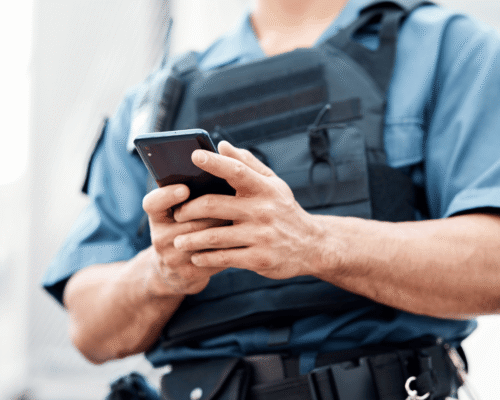Can Police Search Your Cell Phone Without a Warrant in San Diego?

Your cell phone is a personal archive. From private messages and photos to browsing history and GPS data, it stores intimate details about your life. That is why one of the most pressing legal questions in modern criminal investigations is: Can the police search your cell phone without a warrant in San Diego? The short answer is generally no, but there are important exceptions.
Thanks to the landmark Riley v. California decision by the U.S. Supreme Court, your digital privacy rights in California are protected under the Fourth Amendment. However, certain exceptions such as consent or exigent circumstances may allow law enforcement to conduct a warrantless phone search.
The Legal Standard: Riley v. California
In Riley v. California (2014), the U.S. Supreme Court unanimously ruled that law enforcement must obtain a search warrant before accessing digital data on a cell phone seized during an arrest. The Court emphasized that modern smartphones are fundamentally different from other personal items because they contain vast quantities of personal information.
The Court’s opinion stated:
“Modern cell phones are not just another technological convenience. With all they contain and all they may reveal, they hold for many Americans the ‘privacies of life.’”
Unless one of the legal exceptions applies, police cannot lawfully search your phone without a warrant.
Exceptions to the Cell Phone Search Warrant Rule
Despite the protections established by Riley, there are narrow exceptions where police can access your phone without a warrant:
Consent
If you voluntarily allow police to search your phone, they do not need a warrant. This is one of the most common ways people unknowingly waive their digital privacy rights in California.
In these situations, it is important to realize that:
- Police do not need to inform you of your right to refuse.
- You have the right to say “I do not consent to a search of my phone.”
- Verbal or written consent gives officers legal authority to proceed.
Exigent Circumstances
Under the exigent circumstances doctrine, police can bypass the warrant requirement if they believe immediate action is necessary to prevent:
- Imminent danger to life
- Destruction of evidence
- A suspect’s escape
For example, if officers believe a suspect is deleting incriminating messages in real time or plotting an imminent act of violence, they may attempt to justify warrantless phone searches under this exception. However, these claims can be challenged in court by a skilled criminal defense attorney.
Plain View Doctrine
If officers see illegal content on your unlocked phone while lawfully accessing another part of it (such as during a lawful search of a call log for missed 911 calls), they may argue the data was in plain view.
This is a legally murky area, and courts scrutinize such claims. Simply unlocking your phone in front of officers does not necessarily give them free rein to browse.
Probation or Parole Conditions
Individuals on probation or parole may have reduced privacy rights, especially if their supervision terms include a search clause. Courts have upheld searches of digital devices in some of these contexts, though not without legal debate. If your device was searched while you were on probation, speak to a criminal defense lawyer immediately.
Challenging Phone Data as Evidence
Digital data obtained from a phone can be highly incriminating, but it can often be successfully challenged. A defense attorney with knowledge of criminal defense technology can examine:
- Whether a warrant was issued
- The scope of the warrant (i.e., did it authorize searching texts, photos, GPS, or cloud accounts?)
- If the warrant was properly executed
- If exceptions to the warrant requirement were improperly applied
- Whether data was altered, corrupted, or misinterpreted
Evidence may be suppressed if your constitutional rights were violated during a phone search, and this means it cannot be used against you in court
Search Warrants and Cloud-Based Data
Another important legal issue involves data not stored on your physical device, such as cloud storage, social media accounts, or synced email. Accessing that data often requires a separate warrant, and some tech companies like Apple or Google may refuse to cooperate unless legally compelled. A knowledgeable defense lawyer can examine whether law enforcement overstepped the boundaries of the original warrant or obtained additional warrants unlawfully.
What Should You Do If Police Want to Search Your Phone?
If you are arrested in San Diego and officers request access to your phone:
- Do not consent. Clearly state: “I do not consent to a search of my phone.”
- Do not unlock the phone. Even if pressured, remain silent and ask for your attorney.
- Do not discuss the contents of your phone. You have the right to remain silent.
- Request legal counsel. Ask to speak with a San Diego criminal defense attorney before answering any questions.
Finding the Right Legal Representation
Digital evidence is playing an increasingly important role in modern criminal prosecutions. Prosecutors routinely use text messages, call logs, photos, videos, social media activity, and geolocation data to support charges or challenge alibis. Without experienced legal representation, defendants risk having their entire digital lives weaponized against them.
At jD Law Criminal Defense Attorneys, attorney James N. Dicks brings over 30 years of experience in criminal defense. As a former LAPD investigator and a Certified Criminal Law Specialist by the California Board of Legal Specialization, he is uniquely qualified to handle complex digital evidence issues. James N. Dicks has received the Avvo Client Choice Award seven times.
jD Law Criminal Defense Attorneys understands technology and the law. This allows us to:
- Challenge the validity of search warrants
- File motions to suppress unlawfully obtained data
- Expose overreach in police search procedures
- Present powerful counter-evidence in your defense
Speak With a Trusted San Diego Criminal Defense Attorney
If you are facing criminal charges involving digital evidence, take action right away. Call jD Law Criminal Defense Attorneys today at (760) 630-2000 for a free consultation.
We will evaluate your case and build a defense strategy focused on protecting your future. Your phone is private, and your rights matter!
Don’t Waste Any Time!
Call us today for a FREE Consultation
(760) 630-2000

- Criminal Law Expert - Led by a Board Certified Criminal Law Specialist. Read More About Board Certification
- 100s of Cases Tried - Since 1990, James Dicks has represented hundreds of clients. Read Bio
- Client Approved - Read our online testimonials from satisfied jD Law Criminal Defense Attorneys Clients. Yelp Reviews
- November 16, 2025
San Diego Burglary Defense: Different Charges for … - November 14, 2025
What Happens If San Diego Police Keep Questioning … - November 4, 2025
Receiving Stolen Property in San Diego: Defenses …





